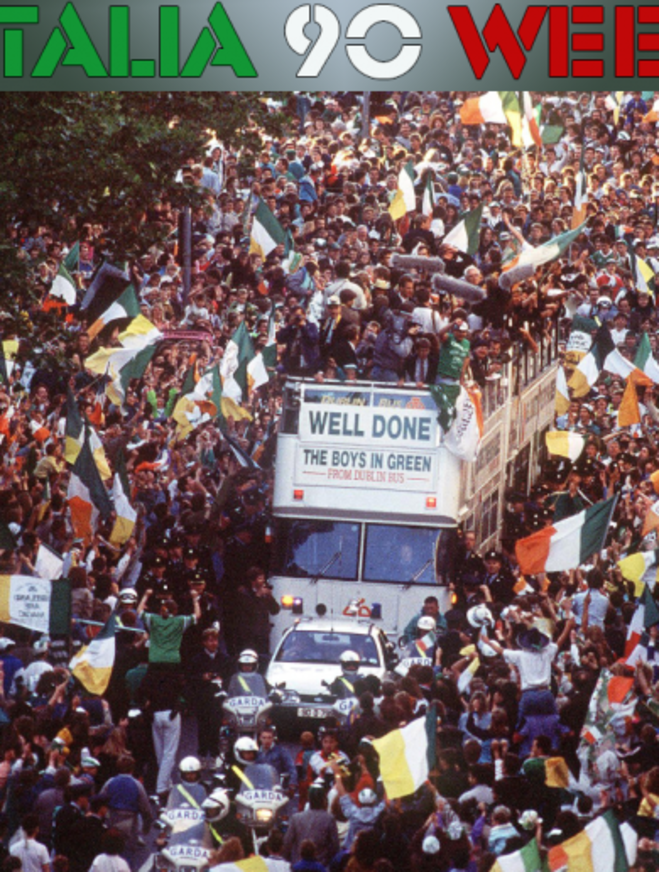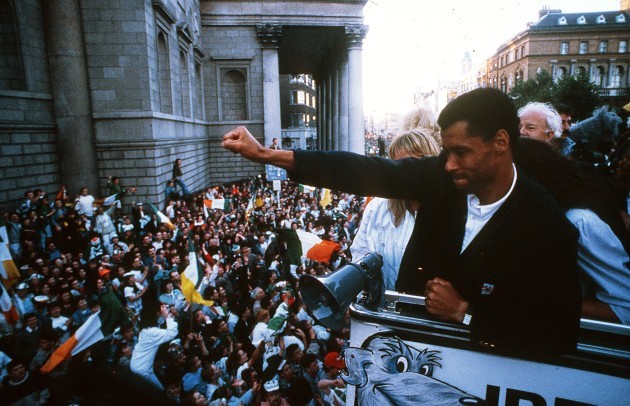AFTER THE EGYPT match, there were some stirrings from the senior players about the conditions. Frank Stapleton, who seemed to be in one big long sulk from the start of the tournament to the end, joked that the IRA had contemplated blowing up our hotel in Palermo but saw it had already been done. The gag didn’t make sense, but I suppose we saw his point.
While the FAI’s officials were enjoying plush conditions, the players were making do in substandard accommodation. Incredibly, Maurice Setters had actually chosen that hotel after a pre-tournament scout around for suitable places to stay.
Frankly, though, I didn’t give a toss about the prison-like conditions, I was just pleased to be there. In any case, me and my barmy room-mate Bernie Slaven were creating our own fun to prevent the boredom. All there was in our Spartan hotel room were the beds and a fruit bowl.
Necessity, so they say, is the mother of invention. So we soon devised a new game whereby I would stand with my back to Bernie, who would launch various different fruits at the bed in front of me from different angles. Seeing an orange or a banana fly past my head, I would have to quickly leap onto the mattress to catch the fruit before it fell. This helped kill the boredom for a while.
But for the established players, having to gain permission before seeing their wives or going for a walk was starting to grate. So Jack wisely decided to take some pressure off by allowing families, wives included, to come and visit the players. He also introduced kegs of Guinness to the hotel, trusting us to have a couple of pints to unwind after (and never before) a match.
Our final group game in 1990 was against the Netherlands. I was not named among the substitutes and that was a big disappointment. On the other hand, I knew that Holland were a top team and that Jack needed to play his senior players, even if they were getting a bit precious about the hotels and the food.
Ronnie Whelan had returned to fitness and experience was needed. So I accepted the decision to leave me out. The game was reasonably contested but after Quinny equalised for us on seventy minutes, it fizzled out as a contest with neither the Dutch nor the Irish committing to going forward. It didn’t make for a great spectacle. I later heard that the referee cautioned Mick McCarthy, along with their captain, telling both men that their teams had to play football. I’m quite sure Mick responded to that request in his customarily brusque manner.
With the match finishing a draw, we finished with identical record to the Dutch. After lots were drawn to determine the standings in the group, Ireland finished second. What an achievement! The football we played wasn’t exactly electrifying, but Ireland, in our first ever World Cup campaign, had qualified for the knock-out stages. Like everyone else, I looked forward to finding out who we’d be pitted against in the next round.
Thanks to our second place, we heard that we’d be facing Romania. The Netherlands, having finished third, would go on to face West Germany. We dared to dream. This was all breathlessly exciting stuff, but I was also missing Deby an awful lot. Because of my abrupt inclusion in Jack’s squad and because Deby was working, she didn’t travel over to Italy. Head over heels in love, it was the longest we had spent apart and, as the weeks dragged on, I was spending a fortune on phone calls home to her. We wrote each other long letters, too, about ten each, which we like to look over now whenever we need a giggle.
At this point, it’s appropriate to acknowledge an ever-present of the Irish World Cup campaign which certainly helped us through: Tutti Frutti. When players are away from home for long periods together it can often feel something like a monastery. Naturally, young men have sexual desires, but a lot of the time we were under curfew.
In those pre-internet days, then, a favourite of the lads was an Italian game show called Tutti Frutti. There was a simple, chauvinistic premise to this show. Two men would compete against one another in a quiz, answering questions from the cheesy game show host. If one got a question wrong his girlfriend, standing beside him, would have to take off an item of clothing. Real smutty, Eurotrash stuff. All bums and boobies, the show was pretty tame by today’s standards.
But come 9pm in the Ireland team hotel, the place was deserted, with everyone scurrying off to watch Tutti Frutti, usually after a theatrical yawn and with the excuse of ‘having an early night’. The lads would be shouting from room to room when the girl’s clothes came off, exaggerated howls of delight echoing down the corridors. In high pressure situations, momentary distractions are an absolute necessity and Tutti Frutti soon became the main topic of light conversation to keep us going; we all looked forward to 9pm.
After being drawn against Romania in the next round, we again worried about the heat. The Romanians would be a lot more used to the conditions than we were. They also boasted the great Gheorghe Hagi, who was to sign for Real Madrid after the tournament. On the bus, Mick Byrne tried to dispel the tension by having the tunes blaring extra loud, including our battle song Seán South of Garryowen.
Jack was always wary of the British press and he faced accusations of ‘treachery’ when it was revealed that we would prepare for games by listening to a song supposedly glorifying terrorism. I know the song is about a martyr of the IRA’s Border Campaign of the late 1950s, but it is a rousing tune which provided more of a psychological boost than a political statement. All nations have their foundation myths and accompanying ditties and most, regrettably, are violent.
It’s some leap to suggest that, by playing that song, the Republic of Ireland football team were endorsing the Provisional IRA. It was all part of the mind games. Rumour. Counter-rumour. Propaganda. As a player, I just tried to ignore all distractions and focus on the football.
Regardless, the day of the Romania game, we all felt the nerves. The anxiety was palpable, with Jack doing his usual touchline fretting. We were boosted massively by the crowd, which was predominately Irish, singing ‘Olé, Olé, Olé, Olé’ throughout, but Romania had an impressive team all the same and we could not break them down either in normal or extra time.
The match, of course, had to be decided by penalties. Up stepped our kick-takers. Sheedy. Houghton. Townsend. Cascarino. All scored, each beating the moustachioed Romanian ’keeper from twelve yards. They were matched by the first four Romanian spot-kicks, which were slotted past Packie Bonner.
Then Daniel Timofte of Dynamo Bucharest made the long walk over to the penalty spot and towards the Irish fans behind the goal. Packie, diving to the right, saved his shot, their final penalty. It was now up to our next penalty taker. Up stepped David O’Leary. Everyone on the bench turned to each other and asked the same question: ‘Why’s Dave taking it?’ O’Leary clutched the ball, bounced it, then carefully placed it, and replaced it, on the spot. He then slotted home the best penalty of the evening with the outside of his right boot, sending us through to the quarter finals.
Then, delirium. We all made a bee line for Dave, smothering him beneath a massive pile on. I have a bad habit of not tying my shoelaces, so as we all charged over, I hobbled a few paces behind. Dave, gasping for breath, managed to make it out of the huddle just as I arrived, and we shared a hug. I had a lot of respect for Dave for scoring that goal. It takes real balls to take a penalty.
I was to score twenty-nine out of the thirty-one penalties I took for Portsmouth, but that was thanks to constant practice. Dave, who wasn’t known for his goal-scoring prowess, decisively took and scored that penalty under the enormous pressure of a World Cup knock-out match. It was a brave act, and was followed by the sheer delight it deserved. Packie, crouched on the turf, started crying. Elation.
After the victory against Romania, we pitched up in a better hotel and players were allowed out to see their families. We were also treated to a video showing clips of the reaction back home in Ireland to Packie’s penalty save. It was only then that the enormity of it all struck me.
We watched footage of people crammed tight in bars, clad in fifty shades of green, in raptures of delight. People from Buncrana to Bandon with their hands raised high, hugging one another, crying, applauding, slapping each other’s backs and falling off chairs. Pictures of thousands of happy faces – not just young men but women, children, old people – all delighted, all grinning and laughing and cheering.
(Paul McGrath acknowledges Irish fans)
And all thanks to ten men dressed in green and one in grey. It was truly moving. The entire squad watched those clips together and I think we all had our mouths open. It was my first real appreciation of the significance of that World Cup campaign for Ireland.
In terms of raising the profile of the game in Ireland, that victory over Romania was probably even more significant than the lifting of the ban on Gaelic sportsmen playing soccer in 1971. More than that, though, our success resonated in a rapidly changing Ireland. When we saw the pictures of people wildly celebrating up and down Ireland, and indeed Britain, it was clear that something a bit more profound was afoot.
When Jack Charlton was appointed Republic of Ireland manager in 1986 some initially resented an Englishman taking charge. A banner unfurled during Jack’s first game in charge of Ireland read ‘Go Home Union Jack’. But now people were deliriously happy about the achievements of his team, many of whom, like me, were British-born.
In many ways, it was a sign that as Ireland entered a new decade, at long last some of the ancestral tensions were dying down, society was changing and maybe, just maybe, things were starting to look up.
The above text is an extract from A Different Shade of Green: The Alan McLoughlin Story by Bryce Evans and Alan McLoughlin. For more info, click here.



